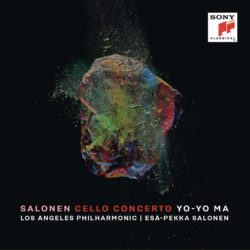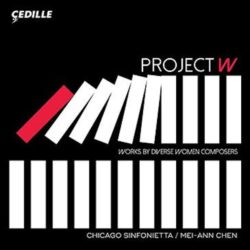Classical CD Reviews: Andris Nelsons conducts Shostakovich, Esa-Pekka Salonen’s Cello Concerto, Project W
By Jonathan Blumhofer
Arguably, the strongest entry in the BSO’s complete Shostakovich symphony cycle thus far; Esa-Pekka Salonen’s 2016 Cello Concerto is emotionally direct and, at times, simply gorgeous; the resurgence of interest in the music of Boston-educated composer Florence Price is a good thing.

The first three installments of the Boston Symphony Orchestra’s (BSO) complete Shostakovich symphony cycle with Andris Nelsons have each taken home a Best Orchestral recording Grammy Award. Will the fourth, out now from Deutsche Grammophon, follow suit?
Who knows – but it should: this is, arguably, the strongest entry in the series thus far.
The release is built around the brooding, enigmatic Sixth Symphony and the propagandistic Seventh, both of which were taped live at Boston’s Symphony Hall.
In the case of the Sixth, Nelsons’ reading is direct and no-nonsense. Its big first movement is grippingly intense and always moves with purpose. The subsequent two movements come over with biting acerbity: the climaxes of the second are particularly ferocious, while the finale barrels through to a raucous last cadence. For interpretive immediacy and excellence of recorded sound, then, this recording is the Sixth’s new benchmark.
As for the Seventh, Nelsons and the BSO don’t top the inexorable power Leonard Bernstein drew from the Chicago Symphony in his classic 1988 recording. But they’re no slouches, either. The long first movement is smartly paced, and it’s to Nelsons’ credit that the latter three don’t simply feel tacked on but fit into a larger vision of the piece while delivering a big emotional payoff. That’s no small accomplishment in this piece.
The Suite from the Incidental Music to “King Lear” and a lively account of the Festive Overture round out this excellently-played and expressively urgent set.

Esa-Pekka Salonen’s 2016 Cello Concerto picks up right where his 2009 Violin Concerto left off. Which is to say, in a beguiling world of ear-catching sonorities that rather gleefully follows their own path.
If you’ve followed Salonen’s music in the decade since he stepped down as music director of the Los Angeles Philharmonic (LAPO), you won’t have any trouble placing this new Concerto, which was commissioned by the Chicago Symphony: echoes of Nyx and Karawane are there, as well as allusions to earlier pieces of his like LA Variations and Insomnia.
Here, though, Salonen’s language is more refined. Still thick and busy, yes, but more emotionally direct and, at times, simply gorgeous.
The first movement is sumptuously lyrical, often colored by subtle percussive scoring. It’s also brimming with counterpoint, sometimes of the most delicate variety. Discreet live electronics come into play during the interlude-like central movement, which builds to a lush climax before leading directly into the finale.
Here, Salonen’s writing lets loose, the solo cello often accompanied by pulsing bongos, maracas, and pizzicato strings. Fragments from the first movement return before the movement unwinds in an exuberant dance that’s interrupted by a series of cadenzas.
Salonen wrote the piece for Yo-Yo Ma, who plays it here with breathtaking command. None of its demands – from crunching quadruple-stops to a last note that’s well off the fingerboard – intimidate the cellist, whose bona fides as a new-music champion are second-to-none.
The composer leads the LAPO in an accompaniment-in-name-only: the ensemble is Ma’s full partner throughout, its playing brightly colored and rhythmically secure.

One of the happy developments in the classical music world of late has been the resurgence of interest in the music of Florence Price. The Little Rock-born, Boston-educated composer and pianist made her home, for about half of her life, in Chicago, so it’s especially appropriate that the Chicago Sinfonietta’s new album, Project W, a survey of music by women composers, begins with some music by Price.
In this case, it’s William Grant Still’s arrangement of Price’s Dances in the Canebrakes, a set of three gently-syncopated movements – “Nimble Feet,” “Tropical Noon,” and “Silk Hat and Walking Cane” – played here with elegant charm.
Clarice Assad’s Sin Fronteras (Without Borders) proves similarly inimitable, opening with a mysterious introduction before launching into a bright, driving exploration of South- and Central American musical styles.
Fresh textures and pulsing energy mark Jessie Montgomery’s Coincident Dances, as they do Jennifer Higdon’s Dance Card, a set of five extroverted, hypothetical dance forms.
In between them come Reena Esmail’s Hindustani-influenced Charukeshi Bandesh and #metoo. The latter, with its thrashing riffs and glowering chords, provides the album with a defiantly emotional anchor.
Mei-Ann Chen leads the Sinfonietta in propulsive performances of all six works. There’s more than enough rhythmic energy to go around but these aren’t simply muscular readings: the Price, Esmail, and Higdon scores are craftily phrased, while the Assad and Montgomery works gambol amiably. In all, then, this is a timely and inviting winner of an album.
Jonathan Blumhofer is a composer and violist who has been active in the greater Boston area since 2004. His music has received numerous awards and been performed by various ensembles, including the American Composers Orchestra, Kiev Philharmonic, Camerata Chicago, Xanthos Ensemble, and Juventas New Music Group. Since receiving his doctorate from Boston University in 2010, Jon has taught at Clark University, Worcester Polytechnic Institute, and online for the University of Phoenix, in addition to writing music criticism for the Worcester Telegram & Gazette.
Tagged: Andris Nelsons, Boston Symphony Orchestra, Cedille, Deutsche Grammophon, Esa-Pekka Salonen, Florence Price
